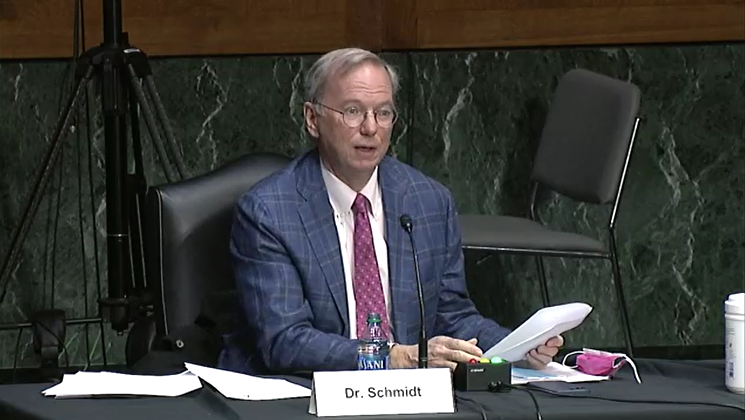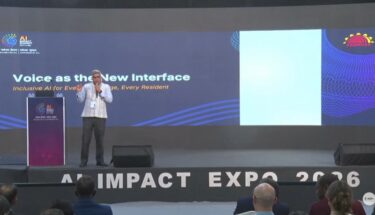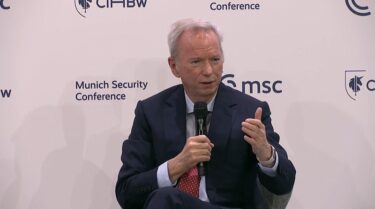Ex-Google CEO Eric Schmidt tells the Senate Armed Forces Committee that the Pentagon’s long design cycles are killing American competitiveness with China, and that, “We need to build missiles the way we now build cars.”
In his opening statement before the Senate Armed Services Committee on Tuesday, Schmidt told lawmakers that the Pentagon should look to how car companies operate to speed up innovation and production for national defense.
“We need to build missiles the way we now build cars,” he said, adding, “It turns out that the modern car plan designs everything in a design studio, knows everything where one presses a button and boom! all that comes out, and they work really, really well.
“The [Pentagon’s] bespoked design approaches […] are completely counter to the way a Silicon Valley company would operate.”
“We need global platforms, or we’ll be forced to use the Chinese ones, which would be a disaster!” — Eric Schmidt
According to Schmidt, China is pushing to meet or beat the work of the United States in each of the following areas:
- Semiconductors — Where both countries are dependent on Taiwan and South Korea.
- AI — Where China catching up relatively soon, according to their doctrine.
- Energy — China is way down the maturation curve; the US needs to jump forward or lose that industry.
- Quantum — China has a well-funded effort, and there are important national security consequences from the use of quantum in a number of areas.
- Communications — We’re all familiar with the dominance of Huawei and the issues for national security. The success of Huawei in the developing world will be a long-term problem for our country.
- Synthetic Biology — The building of life. China is busy building a biobank and is trying to sort of come to global domination in a number of key areas.
“These are contests of values as well as investments,” said Schmidt.
“It’s important that American values — the things that we hold and cherish so deep — are the winners in all these technological areas,” he added.
From Schmidt’s perspective, America’s private sector is the key to accelerating government efforts in countering China’s advancements.
“Synthetic Biology: The building of life. China is busy building a biobank and is trying to come to global domination in a number of key areas” — Eric Schmidt
“The important thing here is that the private sector is America’s great strength,” said Schmidt.
“We move faster and [more] globally than any government could. Fast, iterative design and product cycles are the key to competitiveness, and we need global platforms, or we’ll be forced to use the Chinese ones, which would be a disaster!” he added.
The former big tech CEO also highlighted that the Pentagon “treats software as a very low priority,” and that “it needs to be treated as a very high priority” because “software is going to drive pretty much all of the interesting accomplishments in a national security sense in the next 10 to 20 years.”
“Fast, iterative design and product cycles are the key to competitiveness” — Eric Schmidt
Speaking from his position as a commissioner for the National Security Commission on AI (NSCAI), Schmidt proposed that the government adopt the forthcoming NSCAI recommendations that will be published on March 1, 2021 (a draft copy of the final report is available here).
Some of the recommendations from the NSCAI draft include:
- Establishing a technology competitiveness council at the White House driven by the Vice President with a newly appointed ‘Assistant to the President for Technology Competitiveness’ serving as the day-to-day leader to get the kind of right attention on all of these issues.
- Discussing AI’s impact on crisis stability in the existing US-Russia Strategic Security Dialogue and creating an equivalent dialogue with China.
- Improving coordination and interoperability between the Intelligence Community and the Pentagon.
- Targeting the military systems that can be accelerated by new designer approaches.
- Figuring out a way to build agreements between American industry and the military.
- Building very tight relationships with trusted strategic partners in other countries.
- Establishing a Civilian National Reserve Digital Corps
- Among many others
Alongside Schmidt, Microsoft President Brad Smith and National Defense Industrial Association CEO General Herbert J. Carlisle, USAF (Ret.) also testified in today’s Senate hearing on “Emerging Technologies and Their Impact on National Security.”
Their written testimonies and the livestream playback from the hearing may be found here.
Eric Schmidt presents 6 proposals for the US to beat China in critical technologies
‘Google is a threat to civilization’ and ‘Eric Schmidt is one of my best friends’: Henry Kissinger












